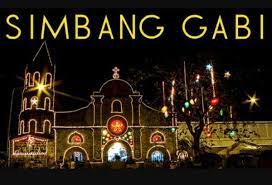In the heart of Filipino Christmas traditions lies Simbang Gabi, a series of pre-dawn masses that illuminate the spiritual landscape of the Philippines during the Advent season. This venerable practice, deeply woven into the fabric of Filipino culture, offers a unique window into the pious preparation for Christmas, blending devotion with cultural identity.
Historical and Cultural Roots
Simbang Gabi, or "Night Mass," originates from the Spanish colonial era, a time when missionaries introduced the novena tradition to the archipelago. Initially intended to accommodate the early morning routines of farmers, these masses gradually transformed into a profound expression of faith and anticipation for the birth of Christ. Held from December 16th to the 24th, this nine-day ritual encapsulates the devout nature and resilience of the Filipino people.
A Symbol of Anticipation and Reflection
At its core, Simbang Gabi is a journey of spiritual preparation, marking the countdown to Christmas. These pre-dawn gatherings, often before the break of day, are not merely a religious obligation but a testament to the deep faith and commitment of the Filipino Catholic community. The serenity of the early hours, combined with the solemnity of the mass, creates an atmosphere conducive to reflection and introspection, allowing the faithful to realign their hearts and minds with the true essence of Christmas.
Community and Festivity
Beyond its religious significance, Simbang Gabi fosters a strong sense of community. These gatherings are more than just religious services; they are reunions, a time when families, friends, and communities come together in a shared expression of faith. The conclusion of each mass is often marked by socializing and the sharing of traditional Filipino Christmas foods, like bibingka and puto bumbong, adding a festive flavor to the solemnity.
The Role in Modern Filipino Society
In contemporary Philippines, the Simbang Gabi continues to thrive as a cherished tradition. It adapts to the challenges of modern life, with some parishes offering evening masses to accommodate those who cannot attend at dawn. This flexibility demonstrates the enduring relevance and resilience of the practice, ensuring its continuation across generations.
A Testament to Devout Preparation
Simbang Gabi's significance in preparing for Christmas goes beyond physical attendance; it is a spiritual journey. Each mass, with its readings and homilies, builds upon the narrative of anticipation for Christ's birth. This progression not only retells the Christmas story but also invites the faithful to ponder the virtues of hope, love, patience, and humility, instilling a deeper understanding and appreciation of the Advent season.
Conclusion: The Heartbeat of Filipino Christmas
In conclusion, the Simbang Gabi stands as a vital component of the uniquely Filipino Christmas, a tradition that encapsulates the nation's devout spirit and cultural richness. Its enduring appeal lies in its ability to blend solemn religious observance with vibrant community bonding. As Filipinos across the globe gather in the dim light of dawn, united in prayer and anticipation, Simbang Gabi continues to be a beacon of faith, a ritual that beautifully sets the tone for the festive celebration of Christmas, embodying the spiritual depth and communal warmth of the Filipino people.

